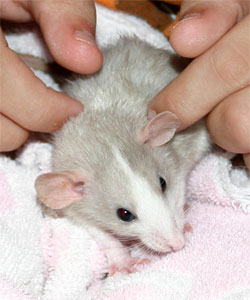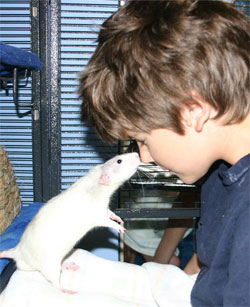Why Rats?
 A rat might be the last type of animal on your
list when you think about adding a small animal to your home and
family, but they shouldn’t be. For most people, a hamster, mouse or
gerbil, or a ferret, guinea pig, or rabbit might be what comes to
mind. Rats, on the other hand, carry with them the baggage of their
wild counterparts – an image of a pest species that carries disease
and causes damage. TV, movies, and books tend to exacerbate this
image, portraying rats as evil, but mice as cute and friendly.
A rat might be the last type of animal on your
list when you think about adding a small animal to your home and
family, but they shouldn’t be. For most people, a hamster, mouse or
gerbil, or a ferret, guinea pig, or rabbit might be what comes to
mind. Rats, on the other hand, carry with them the baggage of their
wild counterparts – an image of a pest species that carries disease
and causes damage. TV, movies, and books tend to exacerbate this
image, portraying rats as evil, but mice as cute and friendly.
The truth is that rats are very intelligent animals that easily bond to people and are far less likely to bite than other pocket pets. They can be trained to use a litter box (for poo, but not for pee), to come when they hear their name, and to do a variety of tricks if you are patient and consistent. They have been trained to do very important jobs, such as detect landmines in Africa and in drug-torn areas of South America because they are trained as easily as a dog but they weigh so little they will not trigger the mines themselves. They can even detect patients who have tuberculosis quickly, accurately, and cheaply, in third world countries where scientific tests are costly and time-consuming. They are frequently used as laboratory animals, even in experiments focusing on psychology and intelligence. They are, in many ways, the closest pocket-pet approximation to a dog.
Because rats form such strong bonds with their human caregivers, they will usually want to come out of their cage and play and interact with you. Because of this, if you have a busy schedule with little down time in your day, a rat may not be the right pet for you. You may do better with an animal that does not form such attachments, such as a hamster, which is content to be left alone much of the time as long as you can provide the appropriate care and maintenance. But if you want an animal that can come out and run around in a rat-safe area for a while, or to snuggle beside you while you watch some television, or that you can train to do interesting tricks and stunts, a rat may be the perfect pet.
Even though rats will bond with people, they also are very social animals and they require company of their own kind. Thus, it is always best to keep them in groups of two or more. The interactions they have with their friends will provide hours of entertainment, and they will be happier and healthier for it. Some pet species will lose the human bond when introduced to a same-species companion, but not rats. They are capable of loving both their people and their rattie friends. However, rats reproduce quickly, frequently, and easily, beginning at a very young age, so unless your rats are spayed or neutered, they should always be kept in groups of the same sex.
The fear of disease is largely unfounded – and is no more a risk than any other small animals. There are very few conditions that can be passed from rat to human, and most of those diseases can also be passed from many other animals - ringworm and salmonella, for example. Rat bite fever is one that comes up a lot, but is actually very rare. Rat bite fever is a form of Streptococcus infection, that can be passed from rat to human via a bite. But it is very rare for a domestic rat to carry this illness and rats are not as likely to bite as other animals, and infection in humans usually resolves by itself without treatment, and should treatment be necessary, it is easily treated with antibiotics. The truth of the matter is that rats are very hygienic animals, they are not carriers of the plague (that was wrongly blamed on them but was actually carried by fleas), and they are unlikely to ever be carriers of rabies because they would die before ever reaching a contagious state.
Rats live short lives – usually 2-3 years in captivity, but may suffer from a variety of health problems that may cut their lives short. The short life span is difficult for many, as it is so easy to become attached and so hard to lose them so soon. However, this can be good for the family who is not sure they can commit long term to a pet, but can be sure to commit for only a few years. Because they are prone to respiratory problems, tumors, and other problems requiring vet care, it is best to understand upfront that rats are not a “cheap” pet and that some money should be set aside for veterinary care. If that is not an option, then adopting a rat is not the best choice at this time.



